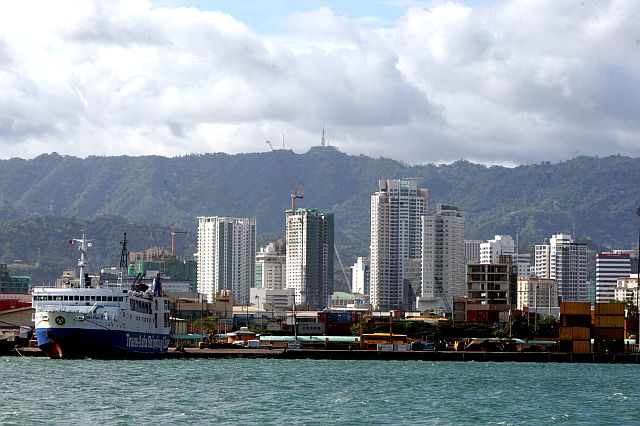Cebu and Region 7 ‘not candidates’ for ECQ

The skyscrapers of Cebu City are seen from the Mactan Channel. |CDN file photo
CEBU CITY, Philippines – Cebu City Mayor Edgardo Labella has expressed confidence that the city will remain under the most lenient level of community quarantine this April.
“I think of the lesson (we learned before), and I am confident and hinaot ko (I really hope) we won’t go back to ECQ (enhanced community quarantine),” said Labella.
And he is not the only official who said so.
Key figures from the Inter-Agency Task Force for the Management of Emerging Infectious Diseases in the Visayas (IATF Visayas), and the Department of Health in Central Visayas (DOH-7) said Cebu, and the entire region for that matter, is ‘a not a candidate’ for ECQ.
“Based on our data, you will find that we are not candidates for ECQ. We have very good case management in the entire Central Visayas,” said Dr. Mary Jean Loreche, DOH-7 spokesperson, on Monday, March 29.
DOH-7 said the measures made both by the public and private sectors in addressing the recent surge of COVID-19 cases were a ‘success’.
“If you look at our statistics, we may have risen in the number of cases, but our response to the increase in cases has been also appropriate,” said Dr. Jaime Bernadas, DOH-7 director, in a separate interview.
Since the national government last week returned greater Metro Manila under ECQ, the strictest form of community quarantine, rumors have been circulating that Cebu might be next due to the latter’s rising cases of COVID-19.
However, Loreche on Monday said that despite the increasing number of new infections, Cebu City’s healthcare system had not been overwhelmed.
She said as of March 28, the critical care utilization rate in the city’s private hospitals was at 35 percent.
“This is still within our safe levels as the warning level is at 60 percent. Plus, we are already seeing a downward trend of our cases, and we’re hoping this will continue in the coming days,” said Loreche.
A separate report from Cebu City’s Emergency Operations Center (EOC) also showed that as of March 27, critical occupancy rates among public hospitals here are at 49 percent only.
READ MORE: EOC: COVID-19 situation in Cebu City ‘improving’
Retired Gen. Melquiades Feliciano, deputy implementer of IATF Visayas, also said the ‘strategic partnership between public and private sectors’ helped the healthcare system in Central Visayas to continue functioning.
Specifically, he pointed to the hotel industry’s willingness to convert some of their rooms into private isolation and quarantine facilities for asymptomatic and suspected COVID-19 patients.
“I believe this (cooperation with the private sector) is not established in other areas, the reason why there is a surge or even uncontrolled spread of Covid like what NCR (National Capital Region) is having now,” said Feliciano.
“We have already established the systems and processes and we are holding on and they are proven to be effective. That is the reason why we have this very controllable situation here,” he added.
As of March 28, there are 6,024 active COVID-19 cases in Central Visayas. Most of these came from Cebu City, Lapu-Lapu City, and Cebu province.
To recall, Cebu City was first placed under ECQ last March 28, 2020 that lasted until May 31, 2020.
It shifted to a more relaxed general community quarantine (GCQ) by June 1, 2020 but it was short-lived as President Rodrigo Duterte approved the IATF’s recommendation to place it back under ECQ on June 15, 2020 due to rapid transmission of the virus as well as hospitals being swamped with COVID-19 patients.
Cebu City only started easing quarantine restrictions when it was downgraded to GCQ on August 1, 2020, and eventually, to MGCQ on September 1, 2020.
/dbs
RELATED STORY: Putting NCR Plus under ECQ shows Duterte admin’s failure – Bayan Muna
Disclaimer: The comments uploaded on this site do not necessarily represent or reflect the views of management and owner of Cebudailynews. We reserve the right to exclude comments that we deem to be inconsistent with our editorial standards.
